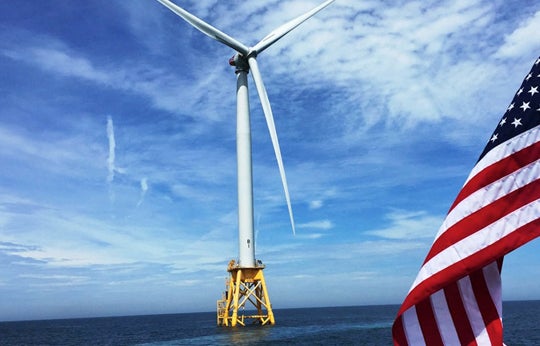By Hugh Markey
When ten whales washed up on the New Jersey shoreline over the course a few months in 2023, people were understandably concerned. What happened here? How did these beautiful animals meet such ignominious deaths? Might the cause have something to do with wind turbines?
URI Ocean Engineering Prof. James Miller says the science just doesn’t point in that direction. “Periodically we read in the news that a whale or some other large animal ends up on the shore, and a lot of times the blame immediately goes to wind turbines. People feel the problem must come from turbine construction noise. Yet when the whales drift ashore, no construction is taking place.”
Miller says most of those whales are either struck by ships or are entangled in fishing nets. “The great whales – the fins, the blues, the humpbacks, the right whales – these are very tough animals. They’re built for the ocean’s rough environment. The sound created from man-made sources is not enough to bother them.
“I was out there last year, and I saw over a hundred large whales. There were whales, and maybe a thousand dolphins. They are doing fine, as far as I can tell.” The one exception, Miller says, is the critically endangered North Atlantic right whale. But, Miller says, those deaths are almost purely from ship strikes and a fishing equipment entanglement.
He points out that there are recommended and mandatory “closed zones” which are continually updated to alert ships when certain species like the North Atlantic are in the area. In addition, there’s a sound system around Massachusetts, Rhode Island, and New Jersey that use instruments which indicate where the whales are at any given time.
Then why are so many people convinced that there’s a connection between wind farm installations and operations and whale strandings? Miller puts much of the blame on the media. “I’ve seen a lot in the press about it, but I have not seen any scientific papers that have connected these (wind farm) surveys or construction with any whale impacts at all. I’ve been in this business for 30 years, and one of the reasons I got interested in whales is because the reporters get all the acoustics wrong. They’re famous for jumping to conclusions.”
To reduce the amount of false information, Miller became involved with the Discovery of Sound in the Sea (DOSITS), run by URI. The site provides information about marine acoustics based on research and published scientific papers. He points out that most of the information is written at a level that the average reader can understand.
Find out more about DOSITS by visiting www.dosits.org.

